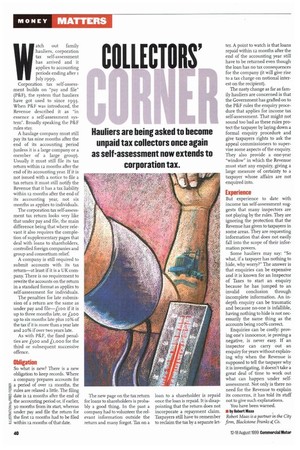COLLECTORS'
Page 42

If you've noticed an error in this article please click here to report it so we can fix it.
Hauliers are being asked to become unpaid tax collectors once again as self-assessment now extends to corporation tax.
Watch out family hauliers, corporation tax self-assessment has arrived and it applies to accounting periods ending after i PAY '999. Corporation tax self-assessment builds on "pay and file" (P&F), the system that hauliers have got used to since 1993. When PELF was introduced, the Revenue described it as "in essence a self-assessment system". Broadly speaking the P&F rules stay.
A haulage company must still pay its tax nine months after the end of its accounting period (unless it is a large company or a member of a large group). Usually it must still file its tax return within 12 months after the end of its accounting year. If it is not issued with a notice to file a tax return it must still notify the Revenue that it has a tax liability within 12 months after the end of its accounting year, not six months as applies to individuals.
The corporation tax self-assessment tax return looks very like that under pay and file, the main difference being that where relevant it also requires the completion of supplementary pages that deal with loans to shareholders, controlled foreign companies and group and consortium relief.
A company is still required to submit accounts with its tax return—at least if it is a UK company. There is no requirement to rewrite the accounts on the return in a standard format as applies to self-assessment for individuals.
The penalties for late submission of a return are the same as under pay and file—boo if it is up to three months late, or £200 up to six months late plus ro% of the tax if it is more than a year late and 20% if over two years late.
As with P&F, the fixed penalties are ken) and £1,000 for the third or subsequent successive offence.
Obligation
So what is new? There is a new obligation to keep records. Where a company prepares accounts for
FL a period of over 12 Months, the h'79 rules are relaxed a little. The filing LT date is 12 months after the end of the accounting period or, if earlier,
g 30 months from its start, whereas
▪ under pay and file the return for 6n the first 12 months had to be filed • within 12 months of that date.
The new page on the tax return for loans to shareholders is probably a good thing. In the past a company had to volunteer the relevant information outside the return and many forgot. Tax on a loan to a shareholder is repaid once the loan is repaid. It is disappointing that the return does not incorporate a repayment claim. Taxpayers still have to remember to reclaim the tax by a separate let
ter. A point to watch is that loans repaid within 12 months after the end of the accounting year still have to be returned even though the loan has no tax consequences for the company (it will give rise to a tax charge on notional interest on the recipient).
The nasty change as far as family hauliers are concerned is that the Government has grafted on to the P&F rules the enquiry procedure that applies for income tax self-assessment. That might not sound too bad as these rules protect the taxpayer by laying down a formal enquiry procedure and give taxpayers rights to ask the appeal commissioners to supervise some aspects of the enquiry. They also provide a one-year "window" in which the Revenue must start any enquiry, giving a large measure of certainty to a taxpayer whose affairs are not enquired into.
Experience
But experience to date with income tax self-assessment suggests that many inspectors are not playing by the rules. They are ignoring the protection that the Revenue has given to taxpayers in some areas. They are requesting information that does not easily fall into the scope of their information powers.
Some hauliers may say: "So what, if a taxpayer has nothing to hide, why worry?" The answer is that enquiries can be expensive and it is known for an Inspector of Taxes to start an enquiry because he has jumped to an invalid conclusion through incomplete information. An indepth enquiry can be traumatic and because no-one is infallible, having nothing to hide is not necessarily the same thing as the accounts being t00% correct.
Enquiries can be costly: proving one's innocence, ie proving a negative, is never easy. If an inspector can carry out an enquiry for years without explaining why when the Revenue is supposed to tell the taxpayer why it is investigating, it doesn't take a great deal of time to work out what can happen under selfassessment. Not only is there no need for the Revenue to explain its concerns, it has told its staff not to give such explanations.
You have been warned.
II by Robert Moos Robert Maas is a partner in the City firm, Blackstone Franks (if Co.








































































































